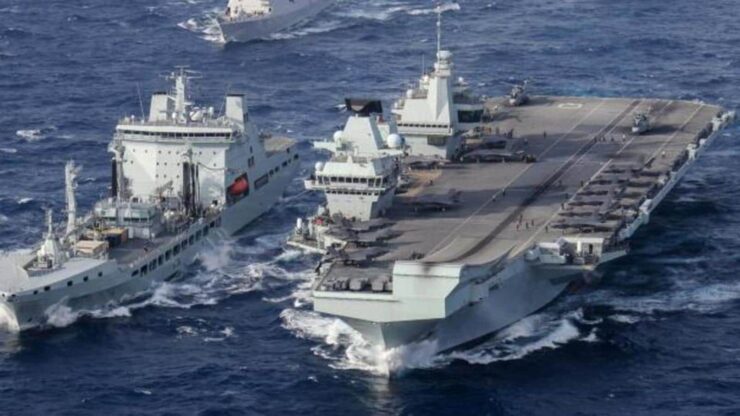
New Delhi. British offer of advanced electrical propulsion systems for warships will be among the major subjects that would figure at the Indo-UK meeting during the visit by foreign secretary Liz Truss and chief of defence staff Gen Nicholas Carter.
The UK also plans to have a more enduring presence in the western Indian Ocean by deploying two offshore patrol vessels in the region from 2022, and a littoral defence group based around amphibious vessels from 2023, sources said.
The first meeting of a working group to discuss cooperation on integrated full electric propulsion systems will be held in Mumbai as part of engagements during a visit by the UK carrier strike group led by the HMS Queen Elizabeth, Britain’s largest warship.
The UK is seen as a leader in these propulsion systems, which are used in the Type 23 frigate and Type 45 destroyer that are part of the carrier strike group. The Indian side has shown interest in the systems, and sources said the two sides were in the very early stage of talks on the issue.
Britain developed integrated full electric propulsion systems and removed risks associated with them while developing the Type 45 vessels, the sources said.
Almost 10% of the UK carrier strike group’s global deployment has been devoted to interactions and exercises with the Indian Navy and the two sides will conduct Exercise Konkan Shakti, the first war games involving all three services of both countries during October 25-27. These drills are part of the shared interest of the two countries to ensure a free and open Indo-Pacific.
The naval interactions are expected to continue even after the UK carrier strike group ends its deployment in November in view of the UK’s plans to deploy the offshore patrol vessels in the western Indian Ocean in 2022, later and a littoral defence group. These deployments are expected to be done from Oman, the people said.
The littoral defence group is a new formation based around amphibious warships and Royal Marines that are aimed at allowing the UK to carry out maritime security tasks, including counter-terrorism, evacuation missions, humanitarian assistance and disaster relief. Sources did not rule out the possibility of joint patrols between the British warships and vessels of regional countries such as India.
Truss, who began a three-day visit to India on October 21, will hold talks with external affairs minister S Jaishankar here before travelling to Mumbai for talks with business leaders. The UK side is keen to launch negotiations with India on a free trade agreement as part of the Roadmap 2030 launched by the two sides in May.
The UK chief of defence staff, Gen Carter, will hold talks with his Indian counterpart, General Bipin Rawat. The Royal Navy chief, Admiral Tony Radakin, who is set to take over as chief of defence staff in November, will also be in India and will hold talks with his Indian counterpart.
Defence and security is one of the five elements of the India-UK comprehensive strategic partnership, the others being trade and investment, climate change, health, and the “living bridge” for the flow of ideas and people between the two sides. The UK’s integrated review of security, defence and foreign policy, unveiled in March, included a tilt towards the Indo-Pacific to unlock new opportunities across the region.








